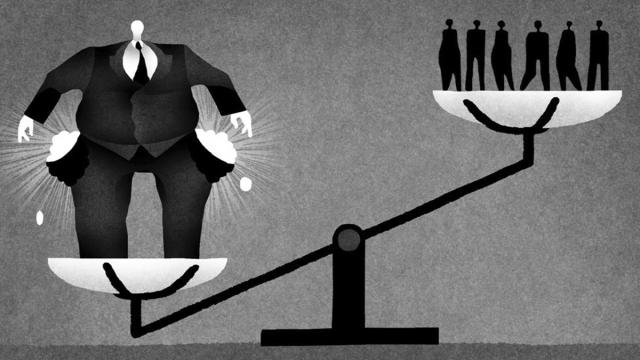
Inequality is much worse than we’re led to believe by a dismissive business media. The numbers are hellish, and they’re growing.
1. The Extreme Wealth Gap is Still Expanding
The U.S. has gained $30 trillion in wealth since 2008, about half of it in the stock market, much of the remainder in real estate holdings. Based on prior analyses, data from Credit Suisse and Forbes, and recent work by Thomas Piketty, Emmanuel Saez, and Gabriel Zucman, it’s a rather simple process to estimate the distribution of our nation’s wealth over that time period. The following are conservative estimates, since the numbers amount to about $15 trillion, the minimum amount by which financial wealth has increased since the low point of the recession.
-
The richest 400 individuals gained an average of $2,500,000,000 each since the recession.
-
The .01% (12,000 households) gained about $120,000,000 each.
-
The rest of the .1% (120,000 households) gained about $11,000,000 each.
-
The rest of the 1% (1,068,000 households) gained about $2,500,000 each.
-
The 2-5% (4,800,000 households) gained about $900,000 each.
-
The 6-10% (6,000,000 households) gained about $285,000 each.
-
The 11-20% (12,000,000 households) gained about $117,000 each.
-
The Bottom 80% (96,000,000 households) gained about $13,000 each.
The distribution of U.S. wealth became even more skewed in 2016, according to Credit Suisse data, with the average 1% household gaining about $3 million in just one year. Nearly half of their windfall came as a transfer of wealth from middle class households (the 40% of households above the median), who lost an average of $35,000 in that same year.
Possibly even worse than the post-recession redistribution of wealth is the nearly 40-year stagnation of income for the bottom half of America. Income for the working-age bottom 50% has not improved since the late 1970s. The share of all income going to the poorest 50% has dropped from 20 to 12 percent. The share going to the richest 1% has risen from 12 to 20 percent.
2. The Biggest Takers are the Most Skillful Tax Avoiders
One might expect the 12,000 households in the .01% to recognize their debt to a society that provides systems of security, technology, law, and finance that disproportionately benefit the richest Americans. But no, they evade an estimated 25 to 30 percent of their personal income and wealth taxes.
The New York Times reported on the so-called “income defense industry,” consisting of a “high-priced phalanx of lawyers, estate planners, lobbyists and anti-tax activists who exploit and defend a dizzying array of tax maneuvers, virtually none of them available to taxpayers of more modest means.” These maneuvers include perplexingly complex partnerships, foreign shell corporations, and “charitable” trusts that can be manipulated to evade most or all of the taxes.
Meanwhile, Congressional friends of the multimillionaires have steadily stripped the IRS of its authority to fight back against the deadbeats.
3. Keeping Americans in the Dark
Only 5% of Americans believe that inequality needs to be addressed by government. Most Americans still think we’re a meritocracy, and that upward mobility is still an American characteristic, even though children born in the 1980s have only a 50% chance of making more money than their parents. Not long ago it was 90%.
No advanced nation is more unequal than the United States. At the end of 2015 only Kazakhstan, Libya, Russia, and Ukraine had a greater degree of wealth inequality. Worst of all is the inequality between – rather than within – countries, largely because of the combined 65 percent share of global wealth owned by North America and Europe.
Yet ignorance about the extreme and expanding level of America’s inequality is perpetuated by misleading statements from conservative and libertarian sources. The Wall Street Journal: “Income inequality is simply not a significant problem.” The Cato Institute: “Even if inequality were as bad as advertised, one has to ask why that should be considered a problem.” George Will: “How income inequality benefits everybody.” The Federalist: “Income inequality is not a problem.”
Inequality is not a problem for the people who own stocks and real estate. For everyone else it’s becoming more and more of a living hell.
What to Do?
At the very least, a financial speculation tax. Financial wealth has grown twice as fast as nonfinancial wealth since 2009, but most of it remains untaxed or tax-deferred, even though the financial industry is one of the main beneficiaries of America’s technology, infrastructure, security, and legal systems. Even the most speculative derivatives gamblers pay NO SALES TAX.
Unfortunately, Wall Street’s friends in Congress have little incentive to implement this sensible tax. Without empathy for lower-income Americans, they’re content to ignore the ugly reality of our ever-widening wealth gap.
3 WAYS TO SHOW YOUR SUPPORT
- Log in to post comments
















